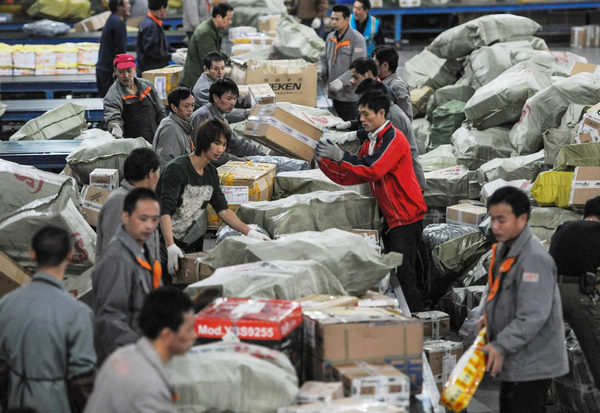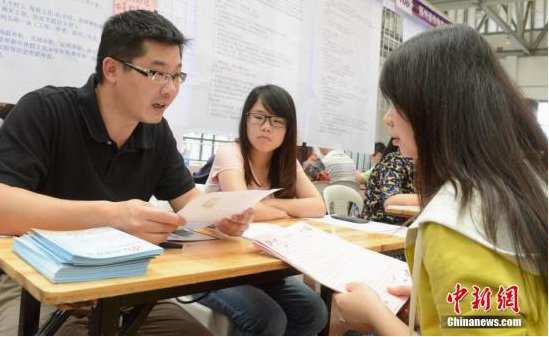China to deliver 50 bln express parcels by 2020: Official
November 5th, 2015China aims to deliver 50 billion express parcels annually, generating 800 billion yuan (126.3 billion U.S. dollars) in business revenue, by 2020, a postal official said Wednesday.
The target is equal to the annual sum of deliveries across the globe today, said Ma Junsheng, head of State Post Bureau in an online interview.
Total express deliveries would near 20 billion pieces with business revenue reaching 400 billion yuan in 2015, Ma said, adding that the sector has registered an annual growth rate of over 50 percent in the past five years, according to Ma.
The country plans to build an efficient and safe express delivery system with nationwide coverage, advanced technology and services and international connections by 2020, according to a policy document released last week by the State Council, China's cabinet.
Despite a slowing economy, express delivery services have grown steadily. The amount of express delivery packages has increased 8.2 times over the past six years. In the first half of 2015, express deliveries jumped by more than 43 percent year on year.
On average, each Chinese person received more than 10 parcels last year, even with only half of the country covered by the delivery network.
JD.com files complaint against Alibaba for 'disrupting market order'
November 4th, 2015
Working staff distribute packs in an express company in Hangzhou, East China's Zhejiang province, Nov 12, 2012. The annual Single's Day which falls on Nov 11 has become a shopping festival under a continuous sales promotion of e-commerce groups.
JD.com Inc,China's second-largest e-commerce site, filed a complaint to industry authority claiming that its rival Alibaba Group Holding Ltd was "disrupting the market order".
In a complaint filed on Tuesday to the State Administration of Industry and Commerce, the Beijing-based company said Alibaba told retailers to pick a side during the upcoming Singles' Day, China's largest online shopping festival, which falls on next Wednesday.
"Alibaba conveyed a message to retailers that if they participated in its Tmall's promotion campaign on the Singles Day, they will not allowed to attend similar events held by rival sites," JD said in a statement.
Alibaba threatened to direct less traffic to retailers who were unwilling to follow its demands, JD claimed, adding "such behavior poses barriers to market competition and severely undermines consumers' interests."
In response, Alibaba said late Tuesday that let consumers decide which platforms they are willing to choose. "Market-related problems should resort to the market for solution. We will continue offering consumers quality products at lower prices," Alibaba said.
The State Administration of Industry and Commerce was not immediately available for comment.
The dispute comes as the country's e-commerce sites intensify efforts to vie for retail partners for the upcoming Singles' Day, when millions of consumers flood to websites for bargain shopping.
Taiwan's manufacturing index drops again
November 3rd, 2015Taiwan's manufacturing industry reported sluggish figures in October, echoing the damp situation of the island's general economy.
The purchasing managers index (PMI), a key indicator for manufacturing, dropped month on month, for a fourth consecutive month, by 0.1 points from September to 46 in October, according to a monthly report from the Chung-Hua Institution for Economic Research, a local think tank.
It also remained below the 50 mark for a fourth straight month, the report said.
A PMI reading above 50 shows expansion in manufacturing activity, while a figure below 50 signals contraction.
All five indicators for the PMI -- new orders, production, inventories, employment and supplier deliveries -- showed a contraction.
Among six industrial sectors, only the sector of chemical, biochemical and medical rose above 50 to 54.1 points in October from 48.4 the previous month. The rest contracted.
Taiwan's GDP in the third quarter shrank by 1.01 percent year on year, the first reduction since the fourth quarter of 2009, when the island was affected by the global financial crisis.
Its authorities announced a package of short-term stimulus policies last week, including subsidies for the purchase of energy-efficient home appliances, for travel and for residents who replace their outdated cell phones with smartphones.
Wu Chung-shu, president of the Chung-Hua Institution, suggested that the island should work out long-term policies to cope with the challenges causing economic slowdown, such as the aging labor force and declining fiscal revenue.
Retaining talent a key concern
October 30th, 2015
An applicant talks to hiring staff at a job fair
Employers in China are the most worried about retaining talent among major global economies while the employees are the most concerned about salaries and health, a Metlife report has said.
The U.S.-based life insurance company said that 47 percent of employers in China are worried that talent shortages will affect their business in the next 12 months, and 71 percent said that retaining existing talent is difficult, the highest among 11 countries and regions where the survey is conducted.
The study found that while raising salaries remain the most effective way in retaining talent in China, 58 percent employees said they will stay with their company if an improved benefits package is offered.
Medical-related benefits are the most sought after benefits, followed by life insurance and retirement plans even if employees have to pay the full costs, it said.
"Globally, we are seeing employers increasingly challenged to find innovative ways to attract, retain and engage talent, and China is no exception," said Maria Morris, executive vice president, Global Employee Benefits, MetLife. "We found Chinese employees are more concerned about healthcare than many mature markets such as the U.S., and we expect fast growth of group insurance market in China throughout the healthcare, life insurance, and pension sectors."
Compared with the U.K. and Russia, Chinese employees are less obsessed with cash incentives, Morris added.
It is the first time Metlife include the Chinese market into its global Employee Benefit Trends Study as the insurer noticed huge potential of employment benefit market driven by domestic and multinational companies demands to retain talent.
The China survey covers nearly 393 employers and 367 full-time employees.
Manufacturing still backbone of the economy
October 29th, 2015Nothing demonstrates the striking power shift between China and the United Kingdom more than the planned investment by China into a high-speed railway and nuclear power station in the UK, deals clinched during President Xi Jinping's recent state visit.
While the UK's industrial advantages have declined, China's have grown. Branded the "world's factory", China is the only country that boasts all the industrial categories as classified by the United Nations. Aside from advantages in traditional labor-intensive manufacturing and consumer goods, China has also gained an upper hand in equipment manufacturing, in which its output now accounts for one-third of the world's total, 2.5 times that of Germany, which ranks second. All this has laid a solid foundation for China's ascension to become the world's second-largest economy.
However, there are also pressures threatening China's role as "world's workshop". Such pressures are not just from pure economic factors such as soaring labor costs, but also from the fact that the market value of domestic electronics giants with numerous patents and annual profits of billions of yuan is lower than that of some loss-suffering enterprises whose market value is only based on speculative concepts.
Such concerns are aggravated by the fact that a number of domestic manufactures have shifted their business to real estate and capital operations and there is declining enthusiasm among university students to study science and technology majors.
However, manufacturing is the country's economic backbone and more importance should be paid to consolidating it as the foundation of the domestic manufacturing sector.
It should be noted that a big country's sustainable economic development can only be built on industrialization, because the modern service sector, which provides the majority of people with decent incomes and employment opportunities, is also built on the foundation of modern manufacturing. This is true not only for developing countries but also developed countries and economies.
If China's aim in the past was how to economically catch up with and surpass developed countries, then its current aim should be how to prevent itself from being overtaken.
Is China's manufacturing sector able and determined to pursue further development and prevent itself from being overtaken by its counterparts in the rest of the world? The answer is yes. A series of emerging trends, from intensified efforts to try new business models and open new markets by some domestic manufacturers to the exploration of the "Internet plus" model, show the foresight and adaptability of domestic producers.
In 2014 alone, a total of 53,140 scientific and technological fruits were registered in China and applications were filed for more than 1.3 million patents. Meanwhile, China's R&D input was 2.09 percent of its gross domestic product that year. The proportion was even higher among such manufacturing giants as TCL.
What China now lacks is not excellent and hardworking technicians and scientists, nor entrepreneurs with a strong market vision and the courage to withstand pressure, nor enthusiastic investors and capital. What it lacks is equitable evaluation of its manufacturers and positive incentives.
It is hoped that the 13th Five-Year Plan (2016-20) can give the domestic manufacturing sector a deserved status and the capital market reasonably evaluates enterprises.
The author, Mei Xinyu, is a researcher at the Ministry of Commerce's International Trade and Economic Cooperation Institute.
Tech, Internet, logistics firms bask in limelight
October 28th, 2015Benchmark ends higher after volatile swings on bourses
Stock prices posted marginal gains on Tuesday as a rally in the technology, Internet and logistics sectors kept the buying interest active.
The benchmark Shanghai Composite Index opened 0.6 percent lower in the morning at 3,409.14 points amid selling pressure after Monday's gains, but made an about-turn in the afternoon and closed 0.14 percent higher at 3,434.34 points.
The Shenzhen Component Index opened 0.6 percent lower at 11,588.94 points, started to gain before noon and closed at 11,758.41 points, a 0.6 percent gain.
The diverse outlooks among investors for the long-term performance of various sectors clouded market sentiment, analysts said.
On the positive side, the benefits of the central bank's rate cuts and removal of caps on interest rates have been gradually profiting the stock market and the real economy alike, according to a research note by Shanghai-based Haitong Securities Co.
However, sluggish growth has narrowed profit margins for many sectors and lower-than-expected data have become a matter of concern, especially after economic growth slipped to its lowest level since 2009 in the third quarter.
"Recent events have tended to illustrate the scale of the task confronting the authorities in managing the policy trade-offs involved in structural rebalancing," said Jenny Shi, managing director and country manager for China at global credit ratings agency Moody's Investors Service.
China needs to engineer economic restructuring, policy reform, market liberalization, and slower credit uptake with the aim of shifting economic growth drivers away from State-led investment, without sacrificing short-term macroeconomic stability, which is a re-balancing challenge, according to Moody's.
More than 500 companies listed in Shanghai and Shenzhen had released their third-quarter results or result forecasts by Tuesday, among which more than half reported gains, according to data from China Galaxy Securities.
Firms in the retail and textile sectors reported positive cash flows, showing signs of recovery in the third quarter after a tough period, said a report in the Securities Times.
Most of the other Asian bourses dropped slightly on Tuesday. Japan's Nikkei 225 lost 0.9 percent, closing at 18,777.04 points while South Korea's KOSPI dropped 0.17 percent, closing at 2,044.65 points.